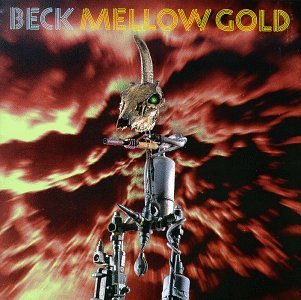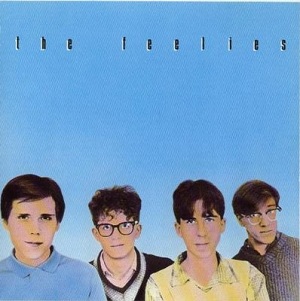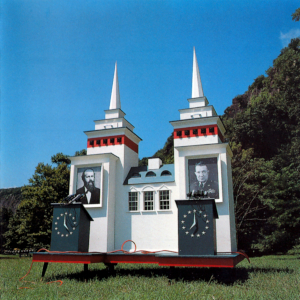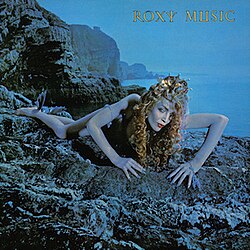The Heck Records column often celebrates loud, distorted guitars. We can’t get enough of Marshall crunch, goopy fuzz, wailing unison bends, hissing feedback, and the total annihilation of a soundwave. But it’s nice to be reminded that before Hendrix and company turned the instrument purely into a conduit for electricity, the electric guitar was simply an amplified acoustic.
After the initial burst of creativity inspired by punk rock began to fade in the early 1980s, bands began looking backwards for inspiration. Groups as diverse as the Soft Boys, the Church, Television Personalities, the dBs, and the Bangles began incorporating elements of the Byrds, the Kinks, Love, and the middle period Beatles. Hell, even paisley made a comeback, so much so that critics called Californian bands like the Rain Parade, Green on Red, and the Dream Syndicate the “Paisley Underground.” The psychedelic sixties weren’t yet gone fifteen years, and already the culture’s relentless churn, an all-consuming maw gobbling innovation and nostalgia alike, had ground them up and added them to the hopper.
However this later generation of musicians was much more cynical than the class of 1967. One need look no further than the political assassinations, riots, and Vietnam death toll of the next year to see that whatever magic existed during the Summer of Love, it was short-lived. Music might get you laid, is fun to play when you’re high, and may’ve soundtracked the burning of hundreds of draft cards, but it won’t spark a “revolution” as Jefferson Airplane extolled on “Volunteers.” Hell, it couldn’t even prevent Nixon from being re-elected.
These ‘60s revivalists borrowed the trappings of the hippie era, but left the politics and free love behind. One of the era’s greatest albums R.E.M.’s Murmur, our Heck Record of the week, has such inscrutable lyrics and mush-mouthed delivery that contemporary critics said Michael Stipe wasn’t singing actual words at all. These bands weren’t borrowing the ideas of the 1960s, they were borrowing its sounds.
First and foremost, that meant the Rickenbacker guitar. While metal musicians were filling stadiums and hardcore musicians were filling basements strumming distorted chord after distorted chord on Les Pauls and superstrats, these revivalists were plucking arpeggios on Rickenbacker guitars, like they were George Harrison. The Rick, whose most innovative player is probably the Byrds’ Roger McGuinn, is an expensive hollow-bodied guitar with treble-y output. When played with a heap of compression, plucked or strummed, it gives songs chiming, airy guitar lines that cut through a mix. It’s this ringing, often out-of-phase guitar work that gave the music of these ‘80s bands a new genre name: jangle pop.
Although jangle bands found inspiration from the folk-rockers, country oddballs, and summertime pop bands, they’re historically the children of post-punk, and thank god for that, because their rhythm sections are much tighter, louder, and funkier than their sixties counterparts. Jangle bands existed in the wake of disco, reggae, and Stevie Wonder. They couldn’t get away with the leaden rhythms of, say, the Byrds’ “Turn Turn Turn.”
Jangle bands were also somewhat weirder than their predecessors. While the Bangles might’ve worked on radio slotted between Herman’s Hermits and “These Boots are Made for Walkin’,” I don’t know what 1967’s DJs would’ve made of, say, Pylon, whose minimalist funk didn’t have antecedents – give or take Bo Diddley – even ten years earlier.
The weirdos had also professionalized by the 1980s. Syd Barrett, Arthur Lee, and Roky Erickson burned bright and bizarre during the psychedelic era, but, by the end of the decade, were creatively spent, as their drug problems and/or mental health issues took over their lives. Not so for Robin Hitchcock and Julian Cope whose surreal lyrics and oddball taste fueled decades long musical careers that continue to this day. Apparently “turn on, tune in, drop out” may be a successful career choice.
Today’s Heck Record isn’t the jangliest or the weirdest album inspired by the lighter side of 1960’s rock and roll, but it is the most important for the future of indie rock. It’s also one of the most self-assured debuts of all time.
R.E.M. would become chart-topping stadium rockers, selling 90 million albums. They would become so critically beloved that they would ace Steven Hyden’s “Five Albums Test” in multiple directions and land two albums on Rolling Stone’s Top 500 Albums of All Time list (Murmur is 165). They would try out new sounds while still maintaining their core identity (though their foray into electronic music would prove dull.) They would, in 1996, right before the quality of their music began to flag, score the biggest recording contract ever offered to a band, a cool $80 million. Their singer Michael Stipe would become famous enough that he felt comfortable picking up the phone and calling heroes like Patti Smith and brave enough to become one of the first white men to Bic his head totally clean. R.E.M. would wrap up their career in 2011 with a dignity that’s lacking 99.9% of legacy rock acts. (Though even if they came back just for a paycheck, I wouldn’t blast them too hard.)
Also, they all seemed to like each other.
If you wanted to pick the #1 Greatest Career for a rock band, R.E.M. would be at the top of the list (also, that’s a pretty fun idea for a column…coming soon?).
However, before they became such an entertainment colossus, they were four punk rock dorks at the University of Georgia in 1980. Stipe met guitarist Peter Buck at a record store in Athens Georgia (they were interested in the same records). They brought in bassist Mike Mills and drummer Bill Berry who had songs from a previous band. By the bandmates’ own accounts, their sound came together almost immediately and effortlessly. Buck’s chiming arpeggios, Mills’ melodic basslines, Berry’s concise, forceful drumming, and Stipe’s enigmatic vocals melded together like peanut butter, chocolate, caramel and Rice Krispies. As someone who has both tried to jam my vision down a band’s throat, and one who has struggled to make musicians with disparate tastes fit together, I’m jealous of their instantaneous and idiosyncratic chemistry.
Others were too, as R.E.M. quickly began out-drawing everyone in the Athens music scene who wasn’t the B-52’s. By 1983, when they recorded Murmur, they were a popular, tight, self-assured group.
That last one is important. Though Murmur was recorded during an era of the most oppressively “modern” production, it doesn’t sound like a typical 1983 rock record with gated drums, synthesizers, and hot shit solos. It sounds, dare I say, like a 1960s album, which means it sounds timeless.
That’s something the band insisted on. When their label IRS tried to pair them with a producer with “modern” sensibilities, they objected, insisting on the same guy who produced their Chronic Town EP. It set them on the right path from the jump. In an era when even roots rockers – looking at you, Springsteen – had albums that sounded so glossy they might as well be plastic, R.E.M. made a throwback masterpiece.
I’ve listened to Murmur dozens of times. It’s the kind of record that rewards close listening, but works just as well as mood music. As long as you’re okay never quite understanding what Stipe is saying, you’ll likely appreciate its charms. I already mentioned the instrumentation, which is iconic. R.E.M. may be one of the last bands where the casual fans know the names of all its members. But what keeps me returning to the album is the backup vocals. Mills is famous for his high tenor – which slays on their cover of the Clique’s “Superman” from 1986 – but it’s Berry’s “oohs” and “ahhs” that fill in the spaces between Buck’s arpeggios. Who needs a synthesizer when you have a drummer that can hold a note?
R.E.M. would never blow out eardrums with their noise (though 1994’s Monster is their take on glam rock; you can find a used CD copy at literally every Goodwill), but by looking backwards, they established a template for underground bands going forward. College rock, indie, and dream pop all owe R.E.M. a debt – which weirdly means that the Byrds are the founders of indie rock. Didn’t think we would end up here.









Comments